India
Telangana Cabinet Approves Draft SC Categorisation Bill: A Historic Step Towards Social Justice

Contents
Introduction to the SC Categorisation Bill
The Scheduled Castes (SC) Categorisation Bill represents a significant legislative effort aimed at addressing the diverse socio-economic conditions of various Scheduled Castes in India. Within the context of Telangana, this bill seeks to provide a structured and equitable categorization of SC communities, facilitating targeted welfare measures and development programs. The essence of this bill lies in recognizing the historical injustices faced by several communities, which have led to disparities in social and economic development among them.
Scheduled Castes encompass a range of communities that have historically faced socio-economic discrimination. In India, these communities have been classified under the SC category to enable affirmative action and ensure their upliftment. However, within the SC category itself, there are significant variations among different castes regarding their socio-economic status. This necessitates a more refined categorization, which the SC Categorisation Bill aims to implement. The Telangana government’s decision to pursue this bill reflects a nuanced understanding of the challenges that various SC groups confront, recognizing that one-size-fits-all measures may not address the diverse needs effectively.
The primary objective of the SC Categorisation Bill is to ensure equitable access to government resources, scholarships, and employment opportunities for each group within the SC framework. By categorizing Scheduled Castes more precisely, the Telangana government intends to formulate policies that cater to the unique requirements of each community. This bill is also seen as a step towards enhancing social justice and fostering inclusivity, which are essential elements for the overall development of society.
In essence, the SC Categorisation Bill represents a crucial intervention in Telangana’s socio-political landscape. Its significance extends beyond mere categorization; it embodies a commitment to addressing historical grievances and promoting equal opportunities for the marginalized sections of society.
Background on Scheduled Castes in India
The concept of Scheduled Castes (SC) in India has its roots in the country’s complex social hierarchy, often referred to as the caste system. Historically, individuals belonging to Scheduled Castes have faced significant social, economic, and educational disadvantages, which have perpetuated their marginalization within society. These disadvantages can be traced back through centuries of discrimination and exclusion, where certain castes were deemed “untouchable” and subjected to various forms of oppression.
The legal framework addressing the rights of Scheduled Castes began with the Indian Constitution, which came into effect in 1950. This Constitution recognized the social inequities faced by SC communities and laid down several provisions aimed at their upliftment. Notably, Articles 15 and 17 prohibit discrimination based on caste and outlaw the practice of untouchability, respectively. This marked a significant step toward equality and the recognition of the rights of marginalized communities in India.
Over the years, various government initiatives have been established to enhance the socio-economic status of Scheduled Castes, including reservations in educational institutions and public sector jobs. Despite these measures, progress has been uneven, and disparities continue to exist, particularly in rural areas where caste-based discrimination remains entrenched. Additionally, previous categorization practices have tried to address population-specific needs; however, they often prompted debates regarding the adequacy and fairness of such classifications.
As we contemplate the Draft SC Categorisation Bill, it is essential to understand this historical backdrop. The ongoing challenges faced by Scheduled Castes emphasize the need for a robust legislative approach, aimed at addressing their unique circumstances and aspirations. By contextualizing the bill within this rich historical framework, stakeholders can better comprehend the implications and significance of this proposed legal reform.
Key Provisions of the Draft Bill
The Draft Scheduled Castes (SC) Categorisation Bill put forth by the Telangana Cabinet encompasses several pivotal features aimed at redefining the framework for SC categorization within the state. The primary objective of this bill is to create a more equitable system by classifying Scheduled Castes into distinct groups based on socio-economic and educational parameters. This categorization is anticipated to ensure that the benefits allotted through various schemes are effectively and appropriately distributed among the eligible communities.
One of the fundamental provisions of the draft bill is the establishment of eligibility criteria for categorization. The proposed criteria include a thorough assessment of socio-economic conditions, educational background, and historical marginalization of different caste groups. This nuanced approach aims to recognize not only the economic disadvantages but also the social barriers faced by particular sub-groups within the Scheduled Castes. Such granularity in categorization is expected to better target assistance and development initiatives to those who need them most.
Furthermore, the draft SC Categorisation Bill outlines potential benefits that could arise from the new classifications. These include increased educational and employment opportunities, improved access to government schemes, and enhanced representation in local governance. Reservations or quotas, a significant aspect of this bill, would ensure that specific percentages of government jobs and educational seats are reserved for the newly classified groups. This strategy intends to uplift historically marginalized communities by providing them with affirmative action support and aimed benefits that cater to their unique challenges.
In summary, the enactment of this bill could lead to a transformative shift in the socio-economic landscape for Scheduled Castes in Telangana, offering a path towards equitable development and empowerment for diverse sub-groups that have long been overlooked.
Reactions from Political Leaders and Communities
The recent approval of the Draft Scheduled Caste (SC) Categorisation Bill by the Telangana Cabinet has sparked varied reactions from political leaders and communities across the state. Supporters of the bill, including some members of the ruling party, assert that the categorization is essential for equitable distribution of resources and opportunities among the SC groups. They argue that the present system does not adequately address the disparities that exist within the numerous communities identified as Scheduled Castes. By recognizing the unique needs of each community, proponents believe that the bill will help in reducing socio-economic inequalities and facilitate better welfare measures for marginalized sections.

Conversely, detractors of the bill raise concerns regarding potential divisions and the complications that could arise from implementing a more granular categorization within the SCs. Some opposition leaders argue that the bill may create rifts among communities that have historically banded together for collective upliftment. They emphasize the need for a unified approach rather than a segmented one, citing fears that categorization could lead to competitive politics over entitlements and welfare benefits, ultimately jeopardizing cohesion among Scheduled Castes.
Affected communities have also voiced their opinions, with mixed responses reported. Some groups express optimism, seeing the bill as a promise for tailored benefits that address specific historical grievances and challenges they face. Others, however, remain skeptical, fearing that the categorization may lead to internal conflict and exacerbate existing disparities rather than resolve them. Social activists across various factions are actively engaging in discussions to assess the implications of the bill while urging that any policy must be inclusively developed with the perspectives of all stakeholders taken into account. This is crucial to ensure that the intended benefits of the bill are realized without further marginalization or discontent among different groups.
Implications for Telangana’s Education and Employment Sectors
The recent approval of the Draft SC Categorisation Bill by the Telangana Cabinet carries significant implications for both education and employment sectors within the state. By categorizing Scheduled Castes (SC) into sub-groups, the bill aims to enhance targeted benefits to SC communities, which could lead to a more equitable distribution of educational resources and opportunities.
In the education sector, the bill is expected to expand scholarship opportunities for students belonging to different SC categories. This strategic allocation is anticipated to increase enrolment rates among these communities, fostering a more inclusive academic environment. Educational institutions may need to revise their admission policies to align with the new categorization. This adaptation will prove essential to ensure that scholarships and financial aids reach the intended beneficiaries, thereby facilitating access to quality education.
Furthermore, the categorization is likely to influence job reservations in public sector employment. The bill proposes a differentiated reservation quota for various SC categories, which may result in a more nuanced approach to representation in government jobs. Employers, particularly in the public sector, will need to review and modify their recruitment strategies to comply with the new reservation framework. This could also inspire private sector companies to adopt more inclusive hiring practices, promoting diversity within their workforce.
In addition, the bill may prompt educational institutions to engage in capacity-building programs aimed at enhancing the skill sets of SC students. Collaborative partnerships between institutions and industry could be instrumental in providing vocational training and placement services tailored to the needs of various SC groups. Overall, the SC Categorisation Bill presents a vital opportunity to recalibrate the educational and employment landscapes in Telangana, fostering inclusivity and equitable growth for marginalized communities.
Comparative Analysis with Other States
The SC Categorisation Bill approved by the Telangana Cabinet has garnered attention not only for its implications within the state but also for its place in a broader national context. Several Indian states have undertaken similar initiatives aimed at the social and economic upliftment of Scheduled Castes (SC). Understanding these legislative frameworks allows us to compare the approaches taken, the challenges faced, and the outcomes achieved across different regions.
For instance, the state of Andhra Pradesh has a comparable bill that delineates various categories within SCs based on historical injustices and socio-economic status. While both the Telangana and Andhra Pradesh bills aim to empower marginalized communities through affirmative action, the categorization criteria and the number of sub-categories vary significantly. Andhra Pradesh’s approach has faced criticism for creating divisions within already marginalized groups, reflecting a challenge that Telangana may also encounter as it moves forward with its legislation.
In contrast, states like Tamil Nadu have implemented a different strategy by incorporating a broader set of criteria for SC representation, emphasizing income-based measures alongside caste distinctions. This holistic approach has reportedly led to more equitable outcomes; however, the nuances of caste dynamics complicate its implementation. The outcomes observed in Tamil Nadu suggest that while categorization can provide targeted benefits, it risks perpetuating existing social hierarchies.
The experience of Maharashtra also illustrates a distinct perspective. Through its SC categorization framework, the state has focused on educational and employment opportunities for all SC groups, resulting in a significant increase in representation. However, the implementation of such policies has often been met with resistance from various factions, leading to political debates surrounding equity and justice within these communities. These experiences offer critical insights for Telangana as it navigates similar waters, highlighting that while targeted policies can drive change, they often require careful consideration of community dynamics and potential unintended consequences.
Critiques and Challenges Ahead
The recent approval of the Draft SC Categorisation Bill by the Telangana Cabinet has sparked a considerable debate, illuminating various critiques surrounding its implications. A primary concern among critics is the potential for increased divisiveness among communities, particularly as the bill aims to categorize Scheduled Castes (SCs) into distinct groups. This categorization may inadvertently create rifts between communities that are otherwise allied in their pursuit of social justice and equity. Opponents argue that dividing the SC community could lead to competition for resources and opportunities, which could undermine the collective efforts towards upliftment and equality.
Moreover, the bill faces significant challenges in implementation. The categorization process itself is expected to be complex, requiring extensive data collection and analysis to ensure fair representation. There are concerns that inadequate infrastructure and resources may hinder the effective execution of the bill, leading to discrepancies and further marginalization of certain SC groups. Implementation challenges may also arise from varying interpretations of the categories and their eligibility criteria, possibly resulting in confusion and conflict among beneficiaries.
Additionally, legal hurdles could impede the bill’s progress. Given the potential for disputes regarding the categorization and allocation of benefits, opponents may challenge the bill in courts, leading to protracted legal battles that may delay the intended benefits for the communities involved. Furthermore, pressure from various sectors—including political parties, civil societies, and social movements—could culminate in organized pushback against the bill. Such resistance may stem from perceived injustices within the categorization framework, emphasizing the need for a more inclusive and equitable approach to addressing the needs of the SC population.
In view of these critiques and challenges, stakeholders must engage in a comprehensive dialogue to harmonize the objectives of the bill with the broader aspirations of the SC community, striving for a solution that minimizes division and maximizes social equity.
Public Engagement and Awareness Efforts
The Telangana Cabinet’s approval of the draft SC Categorisation Bill marks a significant step toward addressing the socio-economic disparities within Scheduled Castes (SC). In light of this development, public engagement strategies have emerged as vital mechanisms to foster understanding and transparency regarding the implications of the bill. Various initiatives are being undertaken to ensure that the community is well-informed and actively participates in discussions surrounding this legislation.
Community meetings are being organized across districts to disseminate essential information about the SC Categorisation Bill. These gatherings serve as platforms for dialogue between the public and government representatives, enabling citizens to voice their opinions and ask questions. Local leaders and representatives from the Scheduled Caste communities often play a crucial role in these discussions, enhancing the relevance of the topics covered. It is crucial for these meetings to be inclusive, allowing diverse perspectives to emerge and ensuring that every voice is heard in the legislative process.
Information campaigns leveraging traditional and digital media are also pivotal to raising awareness about the bill. Brochures, posters, and social media posts are being utilized to communicate the main provisions and objectives of the SC Categorisation Bill effectively. By utilizing a mix of outreach methods, these campaigns aim to educate various demographics about the bill’s provisions, thus reducing misinformation and fostering informed public opinion.
Additionally, non-governmental organizations (NGOs) play a significant role in this engagement process. Many NGOs are leading initiatives that promote transparency by hosting workshops and informational seminars aimed at enhancing community understanding of the bill. These organizations bring expertise and advocacy skills to the forefront, ensuring that the voices of the Stakeholders are considered in the legislative process, thereby strengthening the democratic foundation of the region.
Conclusion and Future Outlook
The recent approval of the Draft SC Categorisation Bill by the Telangana Cabinet marks a significant shift in the state’s approach to promoting equality and social justice for scheduled castes. This legislative movement seeks to categorize various scheduled caste communities, enabling a nuanced understanding of their respective socio-economic challenges. By doing so, the bill aims to enhance targeted welfare measures, improving access to education, employment, and social inclusion for underprivileged groups.
One of the key takeaways from the discussions surrounding the SC Categorisation Bill is its potential to rectify historical injustices faced by marginalized communities in Telangana. Authorizing specific classifications could lead to tailored government programs that address the unique needs of each group, fostering better opportunities for upward mobility. Furthermore, the implementation of this bill could help mitigate disparities in resource allocation, ensuring that assistance effectively reaches those who require it the most.
Looking ahead, the legislative landscape regarding scheduled castes in Telangana is likely to evolve further. There is a growing momentum for similar initiatives in other states, addressing caste-based disparities across the country. This could pave the way for a national dialogue on scheduled caste categorization, generating discussions about best practices and successful implementation strategies. Stakeholders, including government entities, non-profit organizations, and community leaders, will need to collaborate to ensure that the objectives of the SC Categorisation Bill are met effectively.
Ultimately, the successful execution of this bill could represent a pivotal turning point for social reform in Telangana, potentially leading to improved living conditions and societal equality. Vigilant monitoring and inclusive policymaking will be essential as this legislative initiative unfolds, ensuring that the anticipated benefits are realized for all scheduled castes across the region.
Crime
Principal Arrested After Student’s Suicide Attempt in Odisha College Over Sexual Harassment Complaint
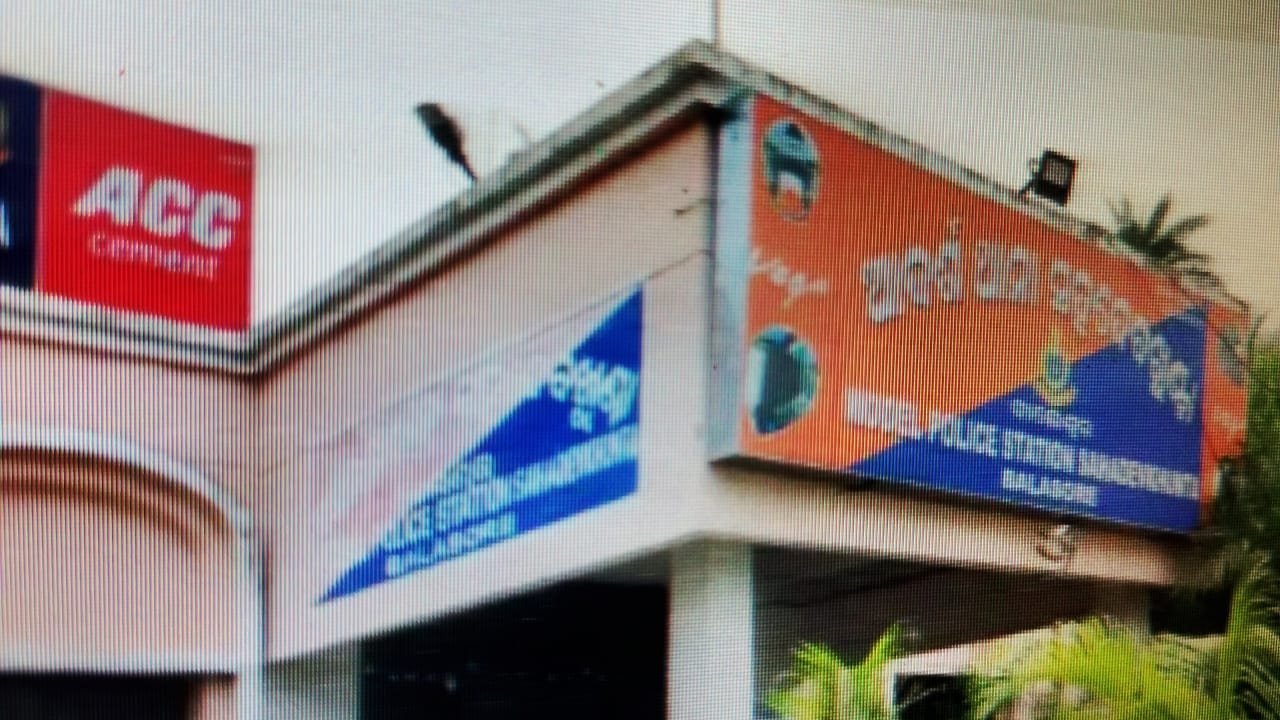
Odisha, July 14,2025
In a shocking development from Balasore, Odisha, the principal of Fakir Mohan College, Dilip Kumar Ghosh, has been arrested by Sahadevkhunta Police following a student’s suicide attempt on campus.
The arrest comes after a female student of the college allegedly attempted suicide on Saturday, accusing a faculty member of sexual harassment. The student is currently in critical condition and receiving treatment at AIIMS Bhubaneswar.
Confirming the arrest, Balasore Superintendent of Police, Raj Prasad, told BBC that the principal was taken into custody for his alleged negligence in handling the student’s repeated complaints.
According to the victim’s family, the girl had been subjected to ongoing sexual harassment for several months. Despite lodging a formal complaint with the college authorities, no meaningful action was taken. Frustrated and distressed by the college’s inaction, the student reportedly attempted to take her own life.
The family had been demanding the arrest of the principal, alleging that he failed to take timely and appropriate action. They also accused the college’s internal inquiry committee of trying to protect the accused teacher, instead of supporting the victim.
Earlier, the police had arrested the Head of the Department (HoD) of the Education Department, Sameer Kumar Sahu, who is the prime accused in the sexual harassment case.
On Sunday, Odisha Chief Minister Mohan Charan Majhi addressed the issue, stating,
“An investigation is underway to understand the full circumstances of the incident. The government will ensure strict action is taken against those responsible.”
The incident has sparked widespread outrage, highlighting the urgent need for stricter enforcement of sexual harassment protocols within educational institutions.
Environment
Literature and Environment Are Both Sources of Sensitivity”Tree is Life: Grand Celebration of ‘Ek Ped – Sampark Ke Naam’ and Poetry Recitation on Environment
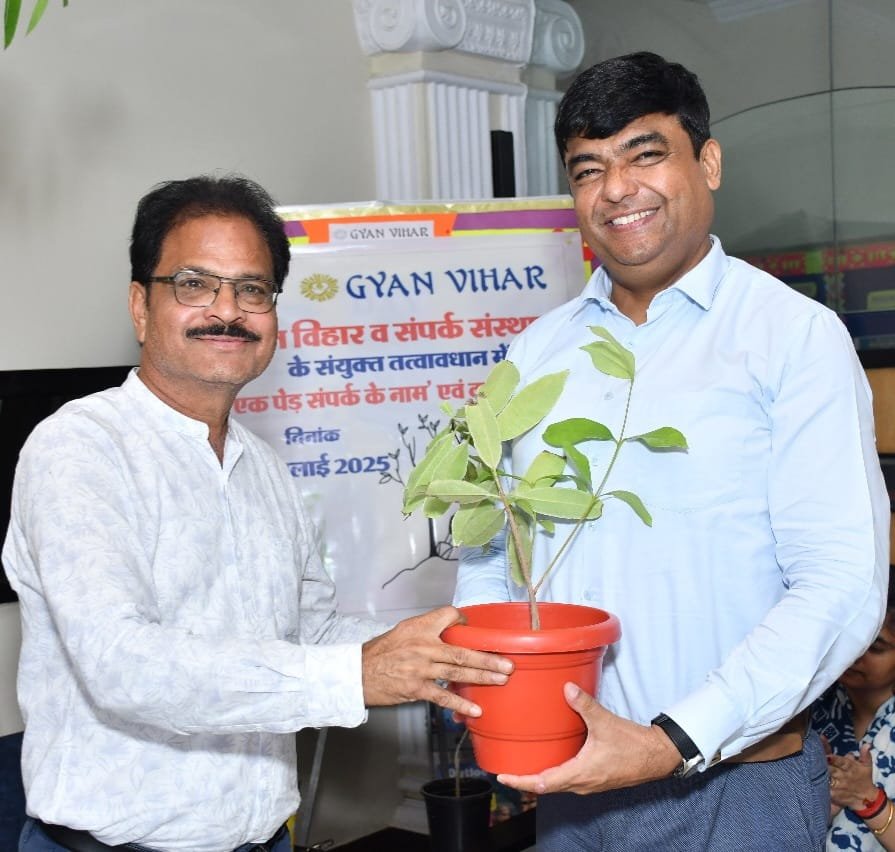
Jaipur, July 14,2025
A Heartfelt Environmental and Literary Initiative by Sampark Sansthan Receives Overwhelming Response at Gyan Vihar School Campus Jaipur.
The joint initiative of Sampark Sansthan and Gyan Vihar School, titled ‘Ek Ped – Sampark Ke Naam’, along with an environmental poetry recital, turned out to be a meaningful confluence of ecological awareness and literary sensibility. Students, teachers, poets, and social workers participated in the event with deep enthusiasm and emotional engagement.
Welcoming everyone, Sampark Sansthan President Anil Ladha remarked,
“This is not just an event, it’s an attempt to connect life and society through tree plantation. We want every individual to nurture a tree as lovingly as they would nurture a relationship.”
Dr. Ritvij Gaur (Principal), present as a special guest, emphasized in his speech,
“Trees are the foundation of our culture and survival. Teaching children to emotionally connect with nature through tree planting is the need of the hour.”

Sampark Sansthan General Secretary and Coordinator Renu ‘Shabdmukhar’ touched hearts with her words,
“This initiative aims to instill in students a sense of responsibility and the spirit of coexisting with trees. When nature and poetry walk together, society becomes truly awakened.”
Veteran poet Prof. Prabodh Govil inspired the audience, stating,
“Literature and environment are both profound sources of human sensitivity.”
Renowned writer Dr. Jayshree Sharma added,
“Trees don’t just give us oxygen, they teach us life values. A poem, a plant, and a thought — these can together change the world.”
Inspiring the young generation, senior poet Anshu Harsh quoted,
“When you walk ahead, many will follow.”
Usha Rastogi’s positive presence brought an energetic vibe to the event.
Program Coordinator Himadri Samarth expressed that,
“No matter what name we give to the campaign, the aim remains the same – to protect the environment.”
He concluded by thanking all the distinguished guests for their participation and support.
The event was beautifully hosted by Seema Walia, whose graceful voice, articulate language, and emotional tone left a lasting impact on everyone present.
The active participation of Gyan Vihar students made the event truly vibrant. When tiny hands touched the soil and planted saplings, it was more than an activity — it became a symbol of emotional bonding with nature.
Students like Charul, along with senior poets — Dr. Neelam Kalra, Renu Shabdmukhar, Himadri, Dr. Kanchana Saxena, Sonal Sharma, Dr. Anju Saxena, Avinash Joshi, Dr. Punita Soni, Kavita Mathur, S. Bhagyam, Rao Shivraj, Dr. Deepali, Vijayalakshmi, Sushila Sharma, Sushma Sharma, Meena Jain, Mahesh Sharma, and Nisha Jha — delivered powerful poetic performances centered on environmental consciousness. The students not only listened but also absorbed the essence of literature as a tool for raising awareness about nature.
The event sent a strong message — if the young generation connects with nature today, the future will be safe, beautiful, and full of hope.
Art
Sattva, Rajas, Tamas” Come Alive on Canvas – Dr. Renu Shahi’s Indian Philosophical Art Shines in Sri Lanka
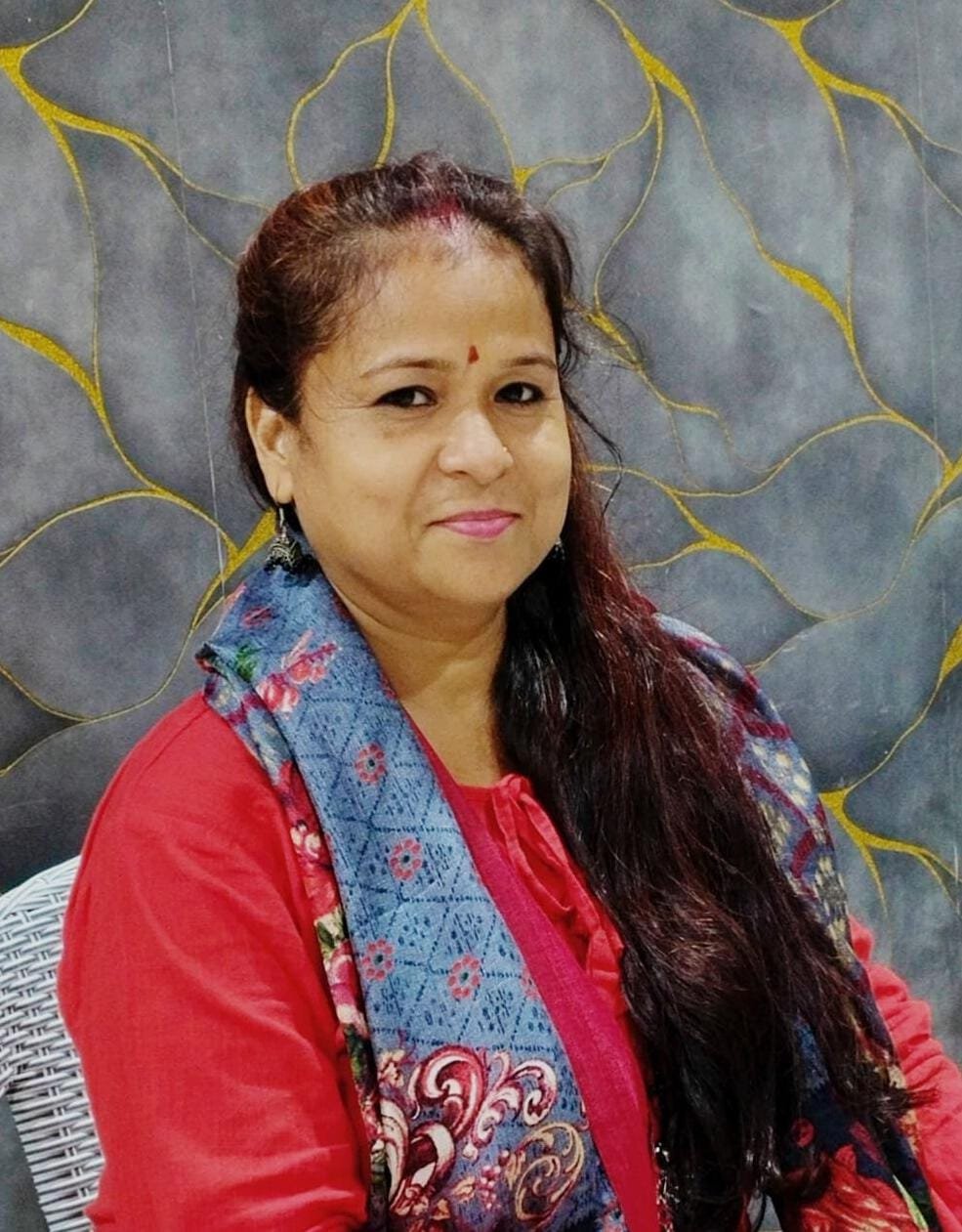
Colombo/Jaipur, July 14,2025
In a vibrant celebration of artistic expression and cultural wisdom, Indian artist Dr. Renu Shahi has drawn deep admiration for her spiritually inspired paintings at an international art exhibition titled “Uncharted”, held at the Curado Art Space in Colombo, Sri Lanka.
Organized by the Rainbow Art Group, New Delhi, this cross-border exhibition featured 49 contemporary artists from six countries, each offering their unique visual interpretations. Amid this diversity, Dr. Shahi’s works stood out — not only for their aesthetic depth but also for their philosophical grounding.
Her three paintings, inspired by verses from the Bhagavad Gita, revolved around the three fundamental qualities of human nature: Sattva (purity), Rajas (passion), and Tamas (inertia). Through rich symbolic imagery and subtle layering, she represented these gunas not merely as abstract ideas, but as divine forces shaping the human experience. Each artwork intertwined color, mythology, and introspection into a single visual meditation.
The exhibition, which ran from July 4th to 10th, was inaugurated by Shanila Alles, Director of Curado Art Space, and curated by Virendra Kumar, the visionary founder of Rainbow Art Group. The group’s mission is to highlight artists who explore Indian culture, spirituality, and heritage through their canvas, offering them a global stage to be seen and heard.
“For us, art is a language that speaks beyond words,” said Kumar. “It transcends geography and unites minds — whether you’re from Jaipur or Jakarta.”

Alongside Dr. Shahi, notable artists such as Banita Rani Singh, Bhaskar Ghosh, Dr. Chetna Agarwal, Manju Saad, Manoj Chakravarty, and Nayana Mevada, among others, showcased their works. Artists hailed not just from India but also from Nepal, Sri Lanka, Qatar, Indonesia, and Belarus. Each piece was a window into the artist’s soul — and some of those windows were so captivating that a few artworks were sold, a testament to the audience’s deep connection with the themes.
Rainbow Art Group has, over the years, emerged as a powerful platform nurturing both emerging and established talent. Its exhibitions reflect a belief that “art needs no passport — it is the purest dialogue between cultures.”
Dr. Renu Shahi’s series served not just as paintings, but as philosophical experiences — introducing Sri Lankan viewers to the timeless teachings of Indian scriptures, not through sermons, but through strokes of color, layers of thought, and a visual silence that speaks louder than words.
Crime
Don’t Hang Nimisha Priya in Yemen: Supreme Court to Hear Plea Today Seeking Diplomatic Intervention to Save Kerala Nurse
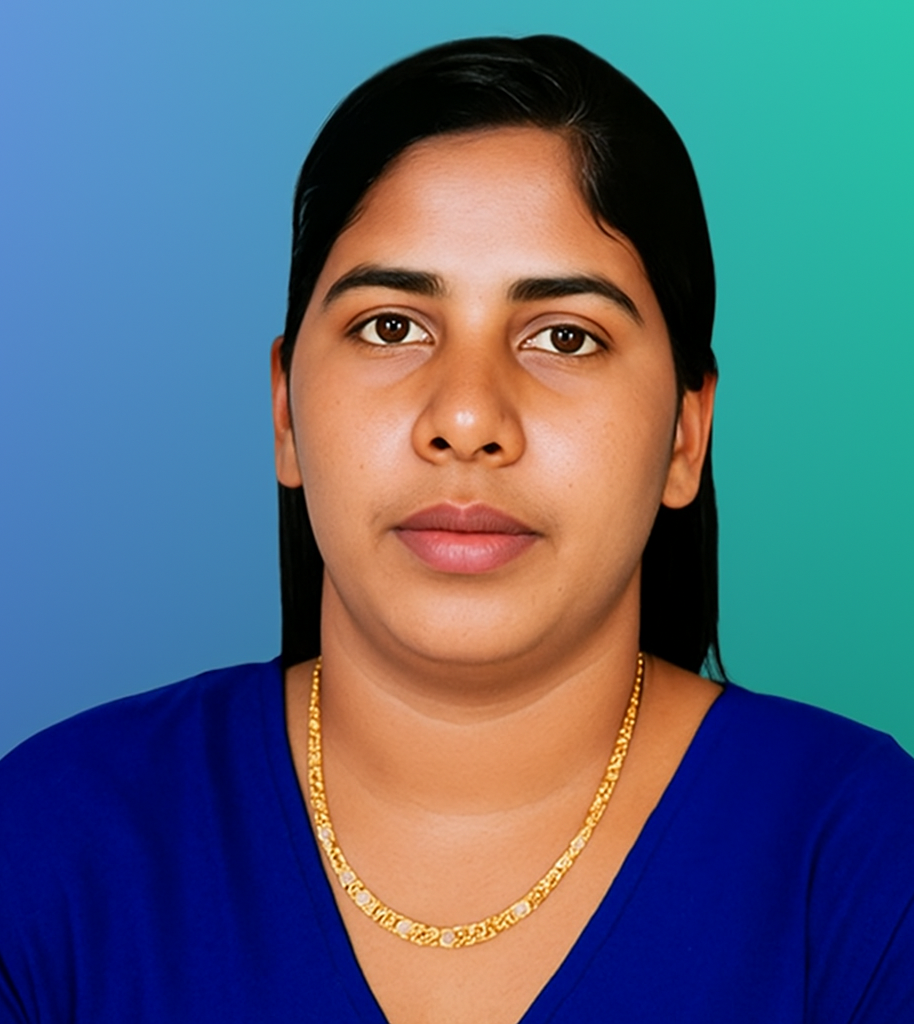
Contents
New Delhi, July14,2025
The life of Indian nurse Nimisha Priya, who has been sentenced to death in Yemen, hangs by a thread. With the execution scheduled for July 16, her family and well-wishers are making desperate last-minute efforts to save her.
Today, the Supreme Court of India will hear a critical petition filed by the Save Nimisha Priya International Action Council, urging the Indian government to step in diplomatically and prevent her execution. The matter will be taken up by a bench comprising Justice Vikram Nath and Justice Sandeep Mehta.
What is Nimisha Priya Accused Of?
According to Yemeni court documents, Nimisha, who has been living in Yemen since 2008, was accused of murdering her business partner Talal Abdo Mahdi. Reports allege that after the murder, she, along with another nurse, dismembered his body and disposed of the remains in a water tank.
However, Nimisha’s family strongly denies the murder charges. They claim that Nimisha did not intend to kill Talal. According to them, she only administered an injection to render him unconscious so she could retrieve her confiscated passport. Tragically, due to an overdose, he died — making it an accidental death, not murder.
Pleas for Mercy Rejected
In a heartbreaking turn of events, Nimisha had earlier filed an appeal against the death sentence in Yemen’s Supreme Court, but it was rejected. She also made a mercy plea to the President of Yemen, which too was denied.
A Mother’s Last Hope
Nimisha’s family has made multiple appeals for help — reaching out to both Kerala Chief Minister Pinarayi Vijayan and the central government. CM Vijayan personally wrote to Prime Minister Narendra Modi, urging him to intervene and use all diplomatic channels possible to halt Nimisha’s execution.
The Ministry of External Affairs (MEA) has stated that it is doing all it can to provide support to Nimisha’s family and is in touch with relevant authorities.
Why This Case Matters
This is not just a legal case; it’s a human story of desperation, fear, and a plea for compassion. A mother, a nurse, an Indian citizen – Nimisha Priya is facing death in a foreign land. Her family is fighting to give her a second chance, hoping that diplomacy and humanity will prevail where legal appeals have failed.
As the clock ticks towards July 16, all eyes are now on the Supreme Court of India and the Indian government — will they act in time to stop the execution and bring Nimisha home alive?
Nimisha Priya, Yemen death penalty, Indian nurse, diplomatic intervention, Supreme Court India, Save Nimisha Priya campaign, Kerala news, Talal Abdo Mahdi, Pinarayi Vijayan, Narendra Modi
Crime
Girls Freed from Chhangur Baba’s Network Now Facing Threats from Pakistan After ‘Ghar Wapsi’: ATS, Agencies on High Alert
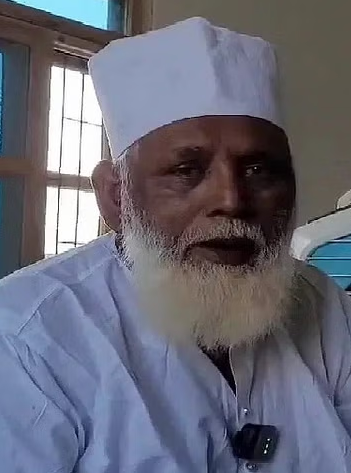
Contents
July14,2025
After the shocking exposure of a large-scale religious conversion racket in Uttar Pradesh run by Chhangur Baba, also known as Jalaluddin, yet another disturbing development has emerged. Several young women who were rescued from his grip and chose to return to their original faith are now allegedly receiving threats — not from local elements, but from across the border in Pakistan. This disturbing twist has put national security agencies on high alert.
What Is the Case About?
Chhangur Baba was arrested by the Uttar Pradesh ATS for running a highly organized conversion racket. He allegedly manipulated and coerced innocent young women into changing their religion. Reports suggest that more than 1,500 girls may have been targeted. Investigations have further revealed possible foreign funding and digital support behind this syndicate.
Now, in a chilling turn, some of the rescued girls’ families claim they’re receiving threatening messages, WhatsApp calls, and videos warning them against “ghar wapsi” — a return to their original religion. Shockingly, many of these threats are suspected to be coming from Pakistan.
Is This Just a Crime — or a Global Conspiracy?
Security experts believe this is no longer just a criminal case. The scale, planning, and international connections indicate a deeper, more dangerous plot. Sources point to extremist groups and digital networks based in Pakistan as potential backers of these threats.
The ATS, along with cybercrime units and intelligence agencies, is now actively tracking the origin of these threats and investigating digital footprints that might lead to cross-border involvement.
Government and Agencies Respond Swiftly
- Girls rescued from the racket have been moved to undisclosed safe locations.
- Cybersecurity experts are analyzing call records, tracking IPs, and monitoring digital channels.
- The state government has ordered a high-level security review for the affected families.
Voices from the Victims’ Families: “We Are Still Living in Fear”
One victim’s brother told the media:
“My sister was brainwashed and forcibly converted. But when she gathered the courage to return to her faith, she got a call — from a Pakistani number — saying she won’t be spared. We are terrified. Even now, we don’t feel safe.”
Our Question: Can a Bulldozer Erase a Mindset?
While the authorities may have demolished Chhangur Baba’s palatial mansion, can demolishing buildings alone put an end to such poisonous ideologies?
Unless the international roots of these syndicates are cut off and mental rehabilitation efforts are made for vulnerable youth, the mindsets that fuel such networks will survive — and resurface.
India
After Historic Space Mission, Shubhanshu Shukla Set to Return to Earth: Here’s What He Accomplished in Orbit
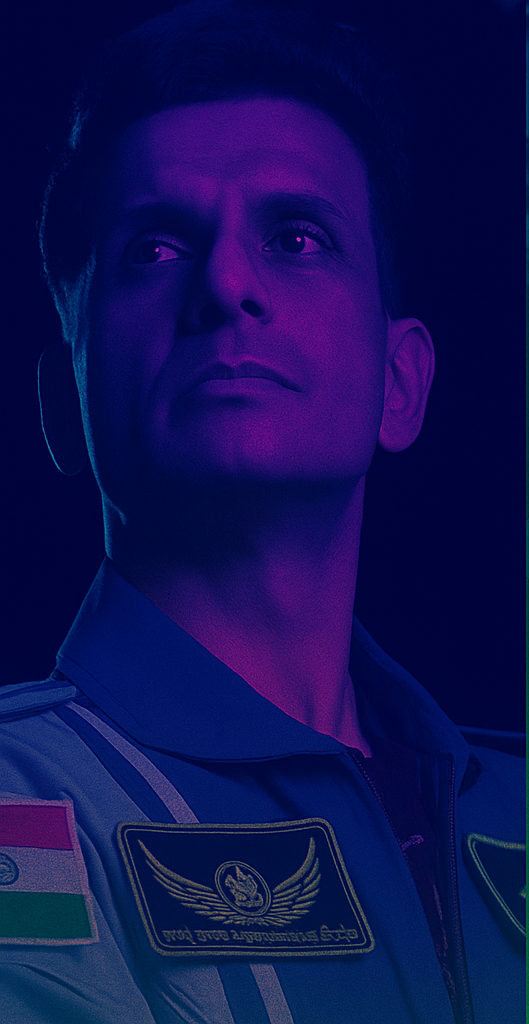
Contents
July14,2025
High above Earth, floating in the vast silence of space, Dr. Shubhanshu Shukla has spent several weeks aboard the International Space Station (ISS). Now, he’s preparing to return home — marking the end of a remarkable journey that made him the first Indian in 41 years to travel to space.
Dr. Shukla was part of a critical international scientific mission, where his work focused on groundbreaking experiments that could impact not only the future of space exploration but also medical and biological research back on Earth.
His spacecraft is scheduled to undock from the ISS today, and if everything goes as planned, he is expected to land safely on the morning of July 15 after a 23-hour return journey.
What Did Dr. Shukla Achieve in Space?
Though the mission was global in nature, Dr. Shukla’s experiments were deeply rooted in Indian scientific priorities. Here’s what he focused on during his time in space:
Microgravity and the Human Body:
Dr. Shukla studied how microgravity affects muscles, bones, and human cells — vital knowledge for future deep-space missions, including potential journeys to Mars.
Testing Advanced Medicines:
In collaboration with Indian medical research institutions, he tested how cutting-edge drugs respond to the unique conditions of space. These findings may lead to more effective treatments for chronic illnesses on Earth.
Adaptability of Indian Biological Systems:
He also explored how Indian-origin plants, microbes, and cells adapt in space. These insights are key to building self-sustaining space stations in the future.
Writing a New Chapter, 41 Years Later
In 1984, Wing Commander Rakesh Sharma became the first Indian to travel to space and famously said, “Sare Jahan Se Achha,” when asked how India looked from above. That moment became immortal in Indian space history. Now, Dr. Shubhanshu Shukla has extended that legacy — not by repeating it, but by adding a bold new chapter.
His mission is not just a personal milestone — it’s a symbol of India’s rising capabilities in science, innovation, and space exploration. It’s a reminder that India is not just participating in the global space race — it’s helping shape it.
India Waits to Welcome a Hero
As the countdown to his return ticks down, excitement is growing — among his family, fellow scientists, students, and millions of Indians across the country. They’re not just waiting to welcome back a scientist — they’re preparing to celebrate a national hero who went beyond the Earth to search for answers that could change it.
Dr. Shukla’s journey was never just about going to space. It’s about inspiring generations to dream bigger, aim higher, and believe that even the sky is not the limit.
Health
Samosa, Jalebi, and Laddoo Join the Cigarette Warning List: What’s Behind Health Ministry’s Advisory?

Contents
New Delhi, July 14, 2025
Imagine this — you walk into a government canteen for your morning chai and samosa, and right next to it is a bold warning sign: “Loaded with trans fat and sugar – consume with caution!” No, it’s not a scene from a health documentary — this is soon to be reality in India’s top public institutions.
In a bold move to tackle India’s rising obesity crisis, the Ministry of Health has issued an internal advisory recommending the display of “Oil and Sugar Boards” across cafeterias and dining areas in all central institutions — including AIIMS Nagpur. These boards will clearly state the hidden fat and sugar content in popular Indian snacks like samosas, jalebis, laddoos, vada pav, and even biscuits.
Junk Food: The New Tobacco?
According to health experts, this is a significant shift in India’s approach to food awareness — equating junk food’s health risks with those of tobacco. “This is just the beginning of a future where food labeling becomes as serious as cigarette warnings,” said Dr. Amar Aamle, President of the Cardiological Society of India’s Nagpur chapter. “Sugar and trans fats are the new tobacco. People have a right to know what they are eating.”
The advisory aims to quietly but powerfully inform citizens about the nutritional risks of their beloved snacks, which are often deeply rooted in cultural habits but packed with unhealthy ingredients.
The Numbers Are Alarming
An internal document from the Health Ministry reveals a sobering prediction: by 2050, India could have 449 million people suffering from obesity or being overweight — second only to the United States. Currently, one in five urban adults in India is overweight. The situation is even more concerning among children, with poor dietary habits and lack of physical activity contributing to a surge in childhood obesity.
‘Not a Ban — But an Informed Choice’
“This is not about banning foods,” clarifies Dr. Sunil Gupta, a senior diabetologist. “But if someone knows that a single gulab jamun contains the equivalent of five teaspoons of sugar, they may think twice before reaching for a second.” Health experts believe this initiative is part of a broader campaign to combat non-communicable diseases like diabetes, hypertension, and heart disease — all of which are directly linked to poor dietary choices.
Nagpur will be among the first cities to implement this model. Rather than restricting food items, institutions will display brightly colored indicators with messages like:
“Eat Smart – Your Future Body Will Thank You.”
The Cultural Wake-Up Call
This move isn’t just about calories and fat grams — it’s a cultural wake-up call. India’s traditional snacks, often seen as symbols of warmth and festivity, are now under the scanner for their health implications. While no one’s taking away your laddoo at Diwali, the government now wants you to know exactly what you’re biting into.
With the line between indulgence and health hazard blurring, this step may redefine the way India eats — not by fear, but by awareness. And in the battle against obesity, that awareness might just be our strongest ingredient.
Focus Keywords: obesity in India, Health Ministry advisory, sugar and fat warning, junk food risks, food labeling India, AIIMS Nagpur, samosa warning label, childhood obesity India
SEO Meta Title: India’s Health Ministry Flags Samosas, Jalebis with Sugar-Fat Warnings Amid Obesity Surge
Meta Description: India’s Health Ministry plans ‘Oil and Sugar Boards’ in institutions to warn about high fat and sugar in snacks like samosas and jalebis. Here’s why it’s being called the ‘new tobacco’.
India
Celebrating Young Minds: Vardhman Srikalyan International School Invites Schools to Dr. Mool Chand Sethia Memorial Inter-School Competitions
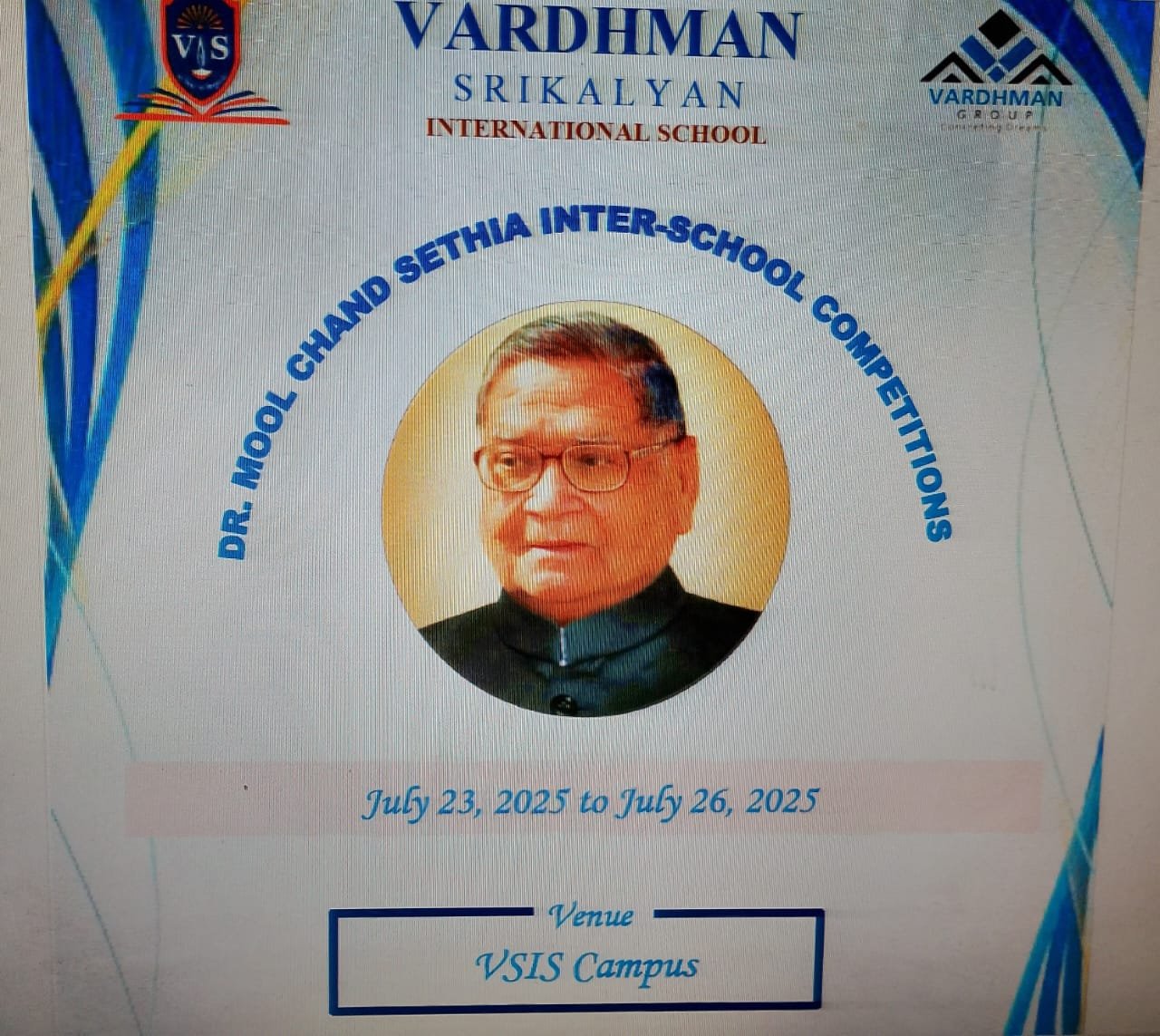
July 14,2025
— A Festival of Talent, Thought & Team Spirit from July 23–26, 2025
In a heartfelt and inspiring move, Vardhman Srikalyan International School, Hathoj, Jaipur, has extended a warm invitation to reputed schools across the region to participate in a prestigious three-day event — The Dr. Mool Chand Sethia Memorial Inter-School Competitions, beginning July 23, 2025. The event will conclude with the much-awaited B.D. Joshi Memorial Debate Competition on July 26, 2025.
The school’s Principal, Mrs. Renuka Joshi, in her message to fellow educators, emphasized that the event is not just a competition, but a celebration of intellect, creativity, and collaborative spirit.
“We aim to create a vibrant, inclusive platform where students can exchange ideas, challenge their boundaries, and celebrate diversity of thought. It’s a rare chance for students to shine beyond the classroom and build friendships that last a lifetime,” she said.
Designed with precision and purpose, the competitions promise to be a confluence of youthful energy and meaningful engagement. Students will get the chance to showcase their talents, explore their speaking and thinking skills, and participate in stimulating dialogue with peers from diverse educational backgrounds.
Schools have been requested to confirm their participation by registering through the official link by July 15, 2025:
🔗 Click here to register
Alongside the registration, a detailed brochure outlining the event structure, themes, and schedules has also been shared to help participants prepare well in advance.
This inter-school meet is expected to bring together bright young minds from various corners of the city — a true testament to the spirit of learning, collaboration, and respectful competition.
Vardhman Srikalyan International School looks forward to hosting a memorable experience — one that plants seeds of inspiration in every student and fosters a culture of excellence.
Accident
Nagaur Horror Caught on Camera: Speeding Car Mows Down Two Pedestrians — One Dies En Route to Hospital

Nagaur, Rajasthan | July 14, 2025
What started as an ordinary morning walk turned into a tragic nightmare for two residents of Sanjay Colony in Nagaur. A high-speed car came barreling down the street and ran over two unsuspecting pedestrians from behind — a scene so brutal that it was caught in chilling detail on a nearby CCTV camera.
The victims, identified as Nathuram and Devisingh, were walking along the roadside when the vehicle struck them without warning. The impact was so severe that both men were thrown onto the road. Shocked bystanders rushed to their aid and immediately informed the police.
Kotwali police arrived at the spot within minutes and shifted the severely injured men to Pandit Jawaharlal Nehru Government Hospital in Nagaur. But the tragedy didn’t end there. As doctors referred both victims to Jodhpur for advanced treatment, Nathuram succumbed to his injuries en route. His body now rests in the mortuary, awaiting post-mortem.
Devisingh continues to battle for his life.
Speaking to the media, police outpost in-charge Gumanaram said, “The car didn’t just hit them — it ran over them. Both men were critically injured. Nathuram couldn’t survive the journey to Jodhpur.”
This wasn’t just an accident. It was a wake-up call. A stark reminder of how a moment’s recklessness can shatter lives.
Locals are demanding stricter traffic surveillance in the area and immediate action against the driver, who is reportedly still absconding.
The CCTV footage has now become a crucial piece of evidence in the investigation, and authorities are using it to trace the car and identify the driver.One moment of speed. Two lives changed forever. One gone too soon.
Education
Passed CA Exam at 71: Retired Bank Manager Tarachand Agarwal Creates History
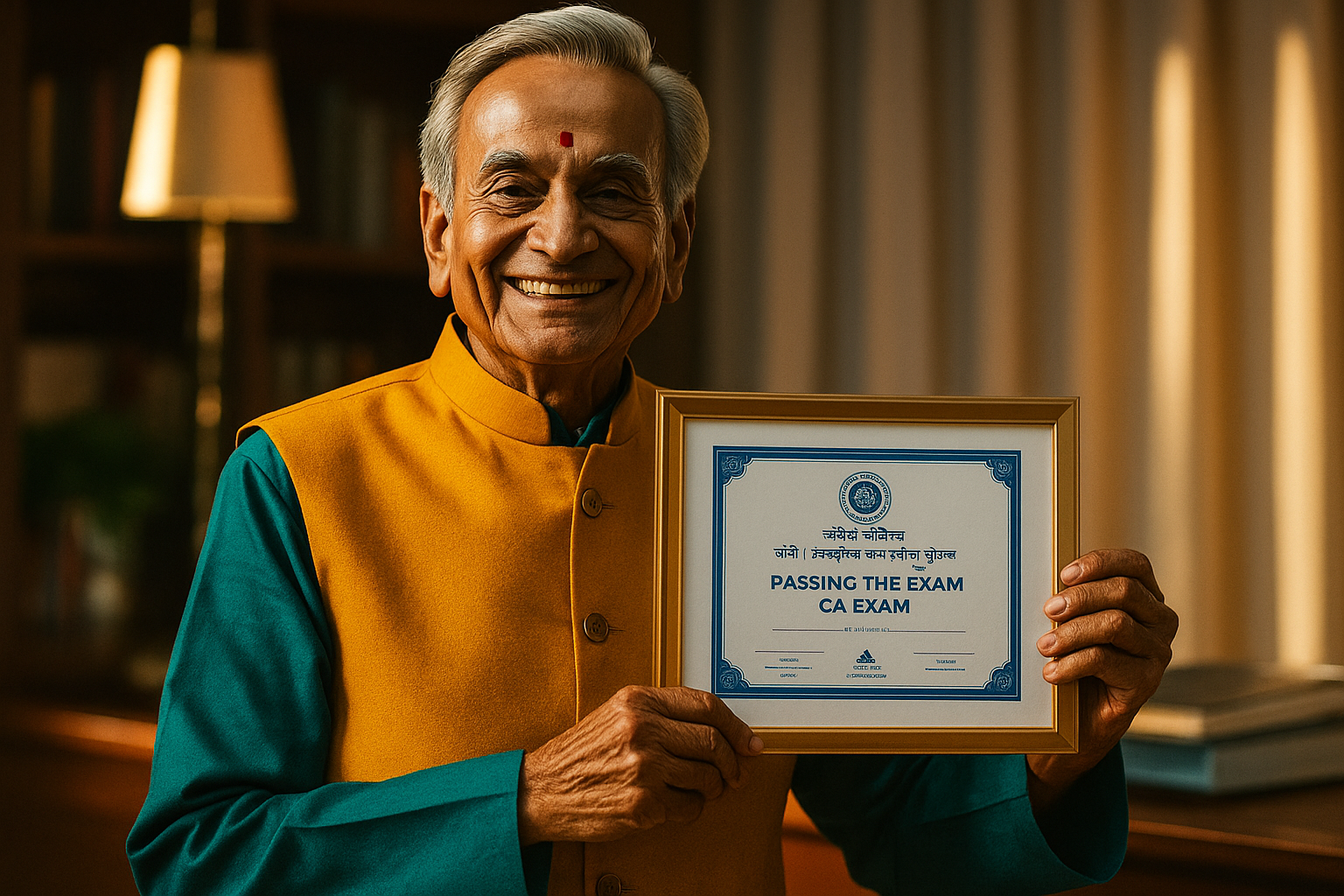
Jaipur, July 12, 2025
“They say dreams have no age — and 71-year-old Tarachand Agarwal has just proved it.” By clearing one of the most prestigious and challenging exams in India — the Chartered Accountancy (CA) exam — he has broken not just age barriers but also inspired a whole generation of youth and senior citizens alike.
Hailing from Rajasthan’s Sikar district, Tarachand Agarwal had retired as a manager from the State Bank of India. But retirement for him wasn’t about slowing down — it was about rediscovering an old dream. Instead of settling into a life of rest, he decided to pursue what he had left behind: becoming a CA. And with the same discipline and dedication as any young aspirant, he started studying again.
Family Became His Strength
His journey was far from lonely. His entire family stood behind him like a rock. His son arranged online study material, his daughter-in-law ensured he ate on time, and his granddaughters made motivational charts to keep his spirits high. The household transformed — it felt just like a student’s home before exams.
Even ICAI Congratulated Him
The Institute of Chartered Accountants of India (ICAI) also acknowledged his incredible achievement with a congratulatory tweet, stating, “Mr. Tarachand Agarwal has shown the nation that learning has no age limit. He is a true inspiration to us all.”
What’s Next for CA Tarachand?
Speaking about his future plans, Tarachand said:
“I want to mentor rural youth who drop out of studies due to financial constraints or lack of self-belief. I want them to know — if I can become a CA at the age of 71, they can achieve anything too.”

 Education1 month ago
Education1 month agoKota ICICI Bank Staffer Swindles ₹4.5 Crore, Gambles It All on Stock Market

 Bollywood1 month ago
Bollywood1 month agoHousefull 5 Movie Review: Akshay Kumar, Riteish Deshmukh Bring Laughter and Twists in Bollywood’s Biggest Comedy Franchise

 Education3 weeks ago
Education3 weeks ago11 Powerful Reasons Why DAV International Yoga Day Jaipur Uplifted Spirits!

 Cricket1 month ago
Cricket1 month agoBengaluru Chinnaswamy Stadium Stampede: 11 Dead, 33 Injured in RCB Victory Parade Chaos

 Education3 weeks ago
Education3 weeks ago7 Inspiring Highlights of DAV Foundation Day Jaipur Celebration – Amazing Vedic Legacy Revealed!

 Education2 weeks ago
Education2 weeks agoEmpowering Educators: A Three-Day Learning Journey at DAV Centenary Public School, Jaipur

 Credent TV3 weeks ago
Credent TV3 weeks agoVIBGYOR Summer Camp Ends on a High at DAV Centenary Public School, Jaipur

 Election7 days ago
Election7 days agoDAV Centenary Public School, Vaishali Nagar, Jaipur Event Report: Talent Hunt Show
































